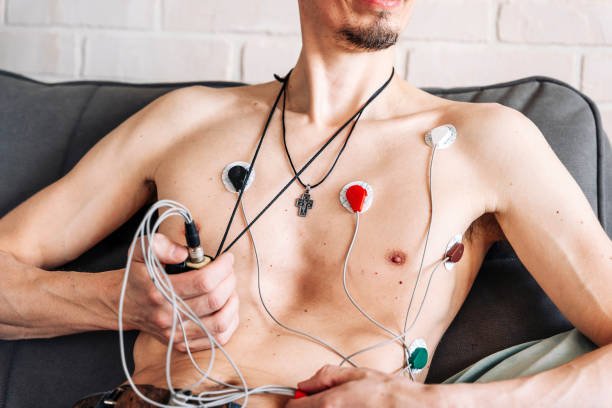
What is Palpitations? Understand the 3 Causes of Heart Palpitations. Heart Palpitations Do Not Necessarily Mean Fast Heartbeats
We all know that the heart beats when a person is alive, but have you noticed that we rarely feel our heart beating? When you really feel that your heartbeat is getting faster or beating irregularly, it is not only sudden, but may also cause an uncomfortable feeling. In fact, this is heart palpitations. This article explains what palpitations are and what causes them.
What is palpitations?
Palpitations is actually a very general term. When you suddenly feel your heart beating, whether you realize that your heartbeat suddenly speeds up, slows down, skips a beat, or becomes stronger, these abnormal beating feelings are called palpitations. .
Whether you are walking or sitting and resting, heart palpitations can occur at any time. The places where you may feel palpitations are not just in the chest. Some people may also feel the discomfort of palpitations in the throat or neck.
When should you seek medical advice?
Although heart palpitations can feel scary, they do not necessarily mean that the heartbeat is too fast, too slow, or arrhythmia.
Generally speaking, there is no need to worry about occasional heart palpitations lasting only a few seconds each time. However, if the patient has a history of heart disease, palpitations last for a long time, and the resting heart rate is higher than 100 beats/minute, he or she needs to go to the hospital as soon as possible. Get relevant heart tests.
If palpitations are accompanied by chest pain, chest tightness, arm, neck, upper back pain, severe difficulty breathing, dizziness or cold sweats, please seek medical attention immediately.

Common causes of palpitations: irregular heartbeat, coffee, panic disorder
There are many possible causes of heart palpitations, and the common causes fall into the following three categories:
- Environment, drugs and psychology:
strenuous exercise, staying up late, insomnia, alcohol, caffeine, nicotine (smoking), cocaine, stress, anxiety, panic and taking antidepressants. - Physiological changes:
dehydration, hormonal changes, too much or not enough thyroid hormone, low levels of oxygen or carbon dioxide in the blood, low blood sugar, heavy blood loss, electrolyte abnormalities, side effects of cold medicine or other medications. - Disease factors:
panic disorder, fever, heart disease, anemia, irregular heartbeat, abnormal heart valves, hyperthyroidism.
Although heart palpitations are harmless in most cases, early medical treatment is recommended if the following conditions apply:
- Have an anxiety disorder that attacks regularly
- pregnant woman
- taking medications containing stimulants
- Hyperthyroidism
- arrhythmia
- have heart disease
- Had heart surgery
- Had myocardial infarction
- heart valve defects
- Groups with high risk of heart disease, such as smoking, high blood pressure, hyperlipidemia, obesity, diabetes, lack of exercise, menopausal women, and those with family medical history, etc.
Complications of palpitations
Palpitations basically have no complications, unless the patient has heart palpitations caused by heart disease, then possible complications are related to heart disease, as follows:
- Faint
- Cardiac arrest
- Stroke
- Heart failure
Diagnosis of palpitations
If you suspect that you have heart palpitations and go to see a doctor, the doctor will first listen to your heart sounds with a stethoscope, understand your past medical history, and may check your heart using the following methods:
- Electrocardiography (ECG or EKG):
Everyone with palpitations must have a static electrocardiogram to check whether there are any abnormalities in the heart rhythm. Although basically if you only use static electrocardiography to detect, usually no problem will be found, because palpitations do not necessarily cause Onset during testing. But an EKG can still help doctors understand whether there are other problems with the patient’s heart that may be causing palpitations.
If the patient’s ventricle has premature excitation (Pre-exitation), such as patients with WPW syndrome, the static electrocardiogram will show shortened PR distance and abnormal delta wave (delta wave).
If there is meaningful left ventricular hypertrophy coupled with ECG leads I, AVL, and V4-V6 representing a deepening of the Q wave in the ventricular diaphragm, it may be hypertrophic obstructive cardiomyopathy. Of concern is that this type may induce sudden death in young people and athletes.
If there are obvious Q wave abnormalities on the electrocardiogram, it can be judged that the patient has had a myocardial infarction before. If the ECG shows a prolonged QT interval, the patient may have Long QT syndrome. - Exercise electrocardiogram (Stress test):
Allowing patients to undergo an electrocardiogram test while exercising. This test can more easily reveal the heart’s operation under stress. - Holter continuous electrocardiogram (Holter monitor):
This electrocardiogram can be carried by the patient and is most commonly used to record changes in cardiac activity within 24 hours. This method makes it easier to grasp and record heart palpitations that you don’t know when they will occur. Trying to find a serious arrhythmia. - Cardiac event recorder (Event recorder):
It is suitable for patients with less frequent heart palpitations. Patients need to manually press a button to record when heart palpitations occur. - Echocardiography:
Use ultrasound to check whether there are abnormalities in the heart structure and blood flow. - Laboratory data: Must include
- A complete blood count (CBC) can assess anemia and inflammation.
- Serum urea, creatinine (Creatinine) and electrolytes can assess electrolyte imbalance or renal dysfunction.
- Thyroid function tests can detect hyperthyroidism.
- A complete blood count (CBC) can assess anemia and inflammation.

Treatment for palpitations
Palpitations that are not caused by heart disease basically do not require treatment. The doctor will infer the possible cause of the patient’s palpitations and then give the patient relevant suggestions. For example: If a patient gets palpitations when he drinks coffee, don’t drink coffee. If palpitations are caused by an irregular heartbeat or other cardiac or psychological disease (such as panic disorder), the doctor will arrange relevant treatment plans based on the type of disease.
How to prevent heart palpitations
The main causes of heart palpitations are psychological stress, stimulants (caffeine, etc.) and heart disease. These three major types, in daily life, you can prevent heart palpitations through the following methods:
- Drink less or no coffee
- Avoid taking medications that can cause heart palpitations
- Avoid high-pressure situations and find ways to relieve stress
- quit smoking
- drink less
- exercise more
- healthy diet












